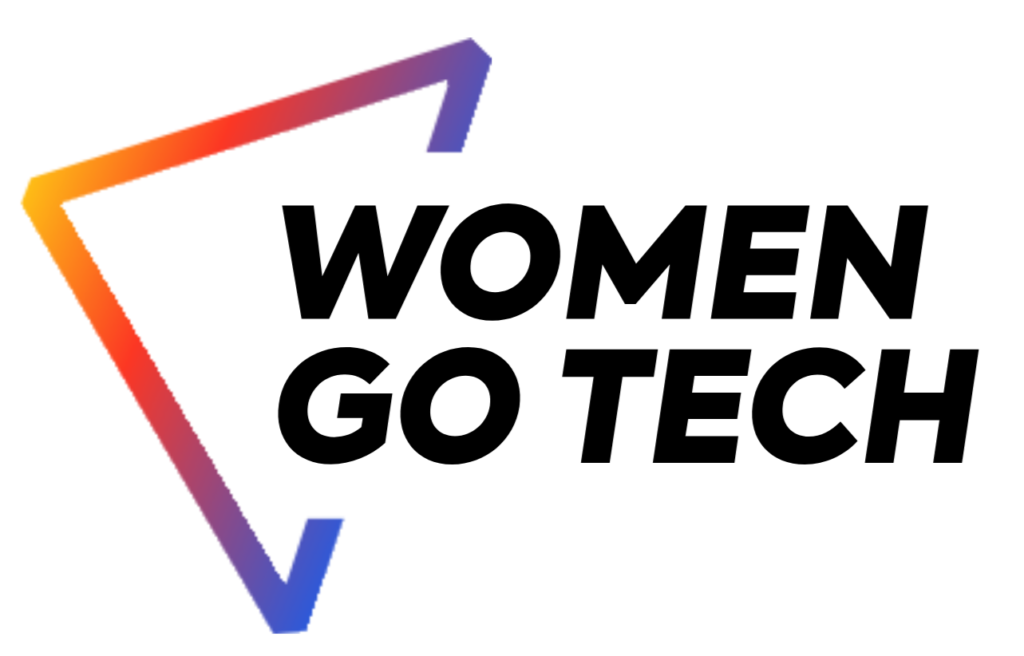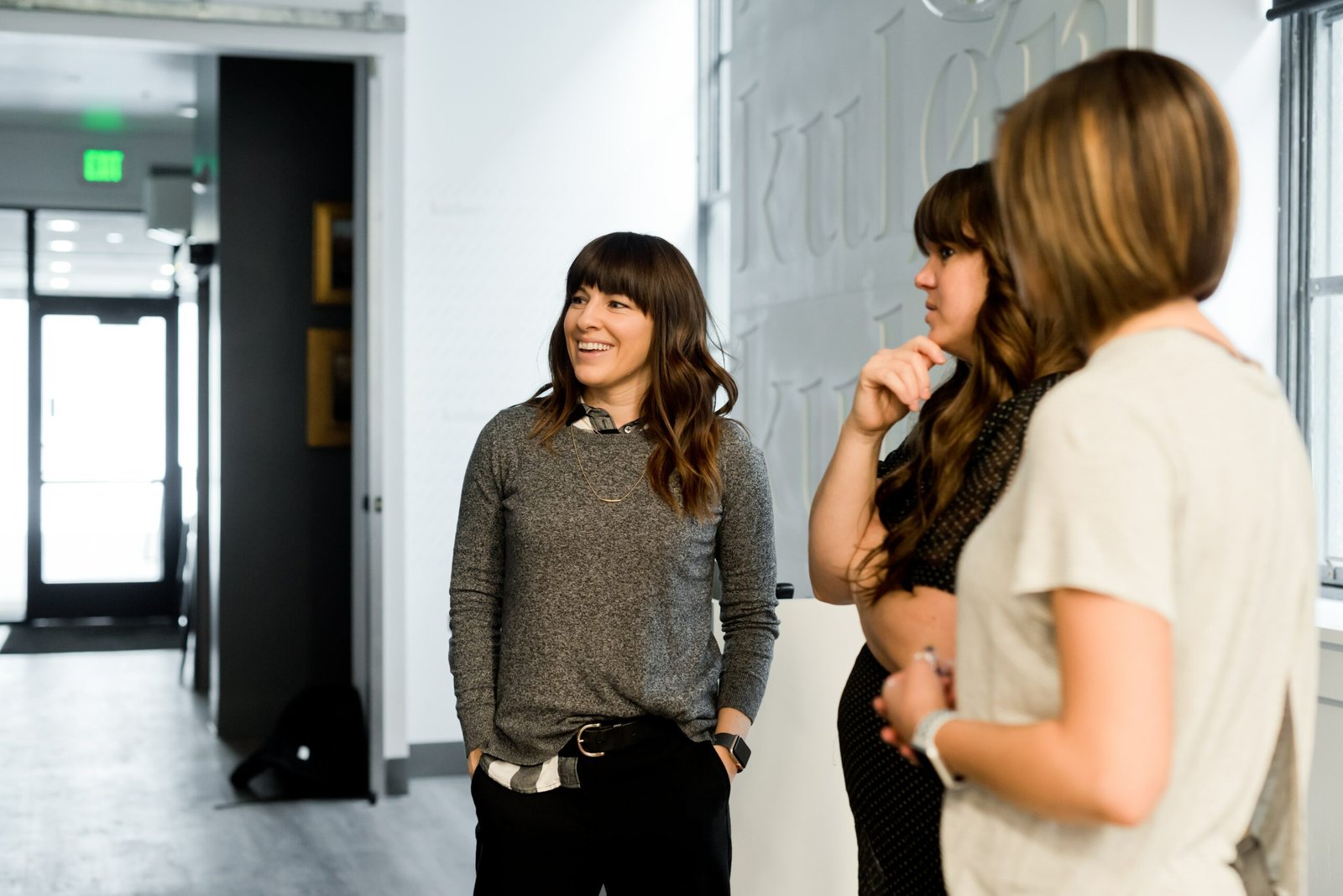
Mentors & Experts
Mentoring is best described as an educational process when mentors share knowledge with the purpose of surfacing potential in their protégés.
Filter by Category
-

Jolita Jezukevičiūtė, Chapter Lead (Tech. Product Owner) at Danske Bank, Women Go Tech ambassador and a mentor in the IT Project Management track is making a significant impact in the […]
Jolita Jezukevičiūtė, Chapter Lead (Tech. Product Owner) at Danske Bank, Women Go Tech ambassador and a mentor in the IT Project Management track is making a significant impact in the tech industry. Beyond her professional achievements, she is deeply committed to mentoring and empowering others. We’re talking to Jolita about her journey as a mentor and the valuable lessons and rewarding experiences she has encountering along the way.
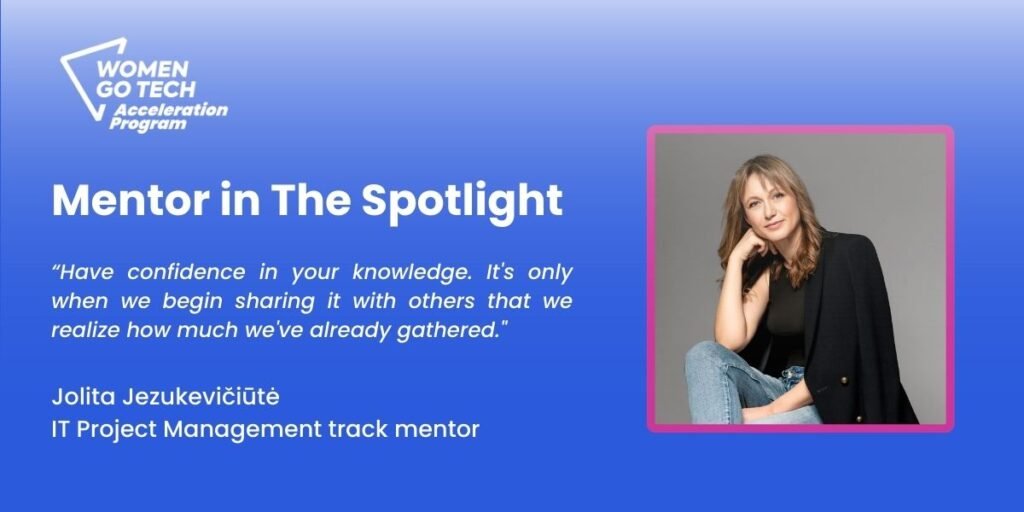
What drove you to become a mentor?
To be honest, I started looking for what would truly inspire me, and mentorship has always meant a lot to me. I was a mentor in previous companies and later in a UK IT program. It was natural for me to continue mentoring because it offers a chance to make someone’s life easier by guiding them into IT. Helping even one person is a huge achievement + you improve yourself along the way.
Last year, I saw on LinkedIn that Women Go Tech was looking for mentors for the Acceleration program, which also supported Ukrainian women. This attracted me even more, so I immediately applied. I love how this community grows with our mentees and constantly improves by seeking feedback. That’s how real trust is built, in my opinion.
What are the top three things you learned from mentoring?
Based on my WGT mentoring experience, I can highlight three key aspects:
- Listening: Mentoring has taught me to truly listen and understand my mentees. Our sessions are focused on them, creating an open and supportive environment where they can shine. During our sessions with mentees, I mostly listen to them and only interject when they have a question or if it is necessary to introduce a new topic. Also, our feedback sessions are actually pretty awesome!
- Quality: The importance of dedicating quality time to each mentee is critical. Last year, I had three mentees, but this year I limited myself to one to ensure I could provide the best support. It’s not about taking on as many mentees as possible, it’s about taking on as many as you can give quality time to. Rushing through meetings doesn’t do anyone any favors.
- Self-motivation: Sometimes, things don’t go as planned. I had a mentee who disappeared at the start of the program. It was disappointing, but I learned that you can’t force someone to be motivated. I reached out a couple of times, but when there was no response, I let it go. It’s important to understand that no one else is responsible for our happiness, motivation, and professional growth. We are responsible for that, and we can’t do the work for our mentees.
What surprised you most, and what was your favorite mentorship moment?
We’re all so different, and that’s what makes mentoring special. One size definitely doesn’t fit all. I thought it would be beneficial to start a project from scratch, combining theory with practice to make it more real-world.
The concept remained the same, but its implementation was very different. For instance, with one mentee, we focused only on theoretical discussions using tools like Miro, while with another, we jumped straight into hands-on practice by using Jira, User story mapping, and Roadmap.
Life has a funny way of surprising you, doesn’t it? It’s also a rewarding feeling to see your mentee progressing. It easily became my favorite part of mentoring.
What advice would you give to new mentors, and is there a mentorship myth you’d like to dispel?
Have confidence in your knowledge. It’s only when we begin sharing it with others that we realize how much we’ve already gathered. While some believe that mentorship is all about the mentor sharing knowledge with the mentee, it’s actually more like a fun exchange where both sides learn and grow together. It’s all about creating a cozy vibe and making teamwork feel as easy as a breeze.
Can you share a mentee success story, and how did it make you feel seeing that success?
Transitioning to a career isn’t easy. Saying goodbye to the past while building the way for a bright future can be tough. That transitional phase simply requires patience, learning, and faith in one’s choices.
I was pleasantly impressed by one of my mentee’s proactivity. She actively contributed by suggesting tasks and engaging in discussions on topics that interested her. I’m incredibly proud of the progress she made during the program. Prior to the program, she was unemployed. After completing it, she found a job at an IT company in Kyiv, Ukraine. Despite the challenging circumstances in the region, her hard work and proactive attitude truly paid off. It’s so inspiring!
-
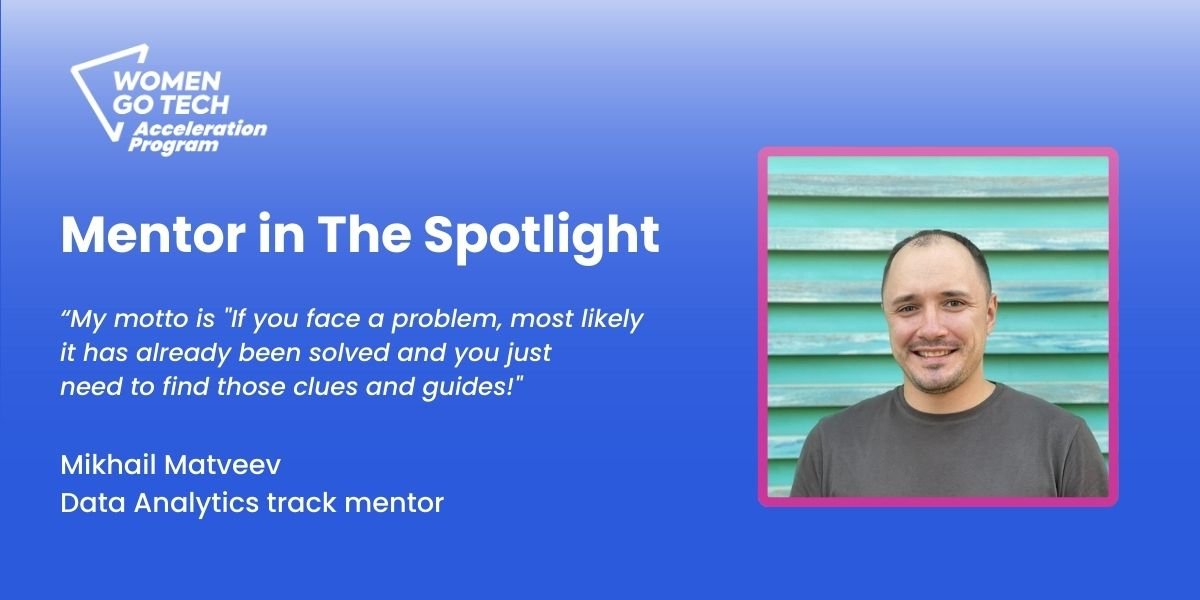
Mike Matveev, the CTO and CDO at B9, has been at the forefront of data analytics for over a decade, navigating the evolving tech landscape from a junior position to […]
Mike Matveev, the CTO and CDO at B9, has been at the forefront of data analytics for over a decade, navigating the evolving tech landscape from a junior position to top management. Now, he’s channeling his rich experience into mentoring, focusing on empowering women in tech through the Women in Tech mentorship program.
In this candid conversation, Mike discusses the transformative power of sharing knowledge, strategies for overcoming career hurdles, and why tech expertise alone isn’t enough to succeed in today’s dynamic industry.

How did you get the idea to become a mentor?
My journey in Data Analytics began 14 years ago. I started from a junior position and then went through all the circles of hell! I’m just kidding, of course, yet every joke has a bit of truth.
I was lucky to have my mentor, who helped me dive into the world of data and look at it from the right perspective. At the time, there were no online academies or courses, so he helped me find books and websites to gain knowledge bit by bit. In my career, I have always learned from other people, asking questions, simply following their steps, and implementing their best practices in my own work. One of the most inspiring examples was my manager at the Binbank team – a lady with incredible technical skills. She taught me to stand for my point of view, to take risks, and to try new things. Now it’s my turn to pay back and help others!
What job issues can be better approached or solved with a mentor’s help?
I started in the banking sphere and have been in different functions – from collection department to sales, product development, operations, marketing, etc. Both in large banks and fast-growing startups in more than 8 countries. I would say despite location, corporate culture, and mission, every banking business has similar “pains”:
– misunderstanding between functions
– inaccurate requirement language
– chaos in teams’ work (waterfall of urgent tasks)
– lack of profound goal-setting and shared vision
In other words, bad management and miscommunications can ruin a promising project even if the competence of the IT team is extremely high.
Data analysts are often treated as supportive IT workers. How can mentorship help a person overcome this stereotype?
For me, an analyst is not just a “service worker” but a specialist who understands a particular business area and can advise the best solution to the function leader. In fact, becoming his partner in finding new ways to boost the processes. Data analysts are the ones who see new directions, open new doors to the teams, and notice subtle signals.
I know many people who are so much focused on technical development that they just don’t see other opportunities lying in their hands.
Sometimes development is not about getting as much new knowledge as you can, it’s about posing the right question. And this is the moment when a mentor can be really helpful!
In general, my motto is “If you face a problem, most likely it has already been solved, and you just need to find those clues and guides!”. Go ahead and just Google it!
How is the mentorship process organized?
It has some formal structure, such as an introduction, discussion of expectations, goal setting, building a framework, etc. We schedule meetings, communicate in chats, share useful links, and discuss particular issues. The whole mentorship lasts from 3 to 6 months, and the progress is always tracked.
At the same time, mentorship is mainly based on a personal approach, sharing experience, giving advice, and developing a leader’s skills. To make the process smooth and pleasant, you need to build trust and good contact. When the mentee opens up, the whole thing goes easier and much quicker.
How did you understand the idea that it’s time to share your experience?
You just start to notice it in your daily working routine: how helpful you could be, how you could guide the newcomers, guiding them to achieve their goals without mistakes, extra efforts and even burnouts. You cannot help but think about it again and again!
Globally, despite the so-called technical development, ChatGPT, and other AI innovations, the data analytics market is still very small. Sometimes it takes up to 6 months or more to find a good specialist. So it’s crucial to help the new people realize what hard and soft skills they need to develop to succeed. And it’s very rewarding, too – you are building the industry!
Why did you join the project supporting women in tech?
There are stereotypes that IT is a male-dominated field, which can lead to biased views from colleagues and employers. Women often have to prove their competence and professionalism more than men. Very often teams in IT companies are mostly male, this can create difficulties in communication and adaptation for women, affect their comfort and work efficiency. I have always had women in my teams and in neighboring technical functions, yet frankly speaking gender ratio was never 50/50. I believe women have huge potential in tech.
You started your career at the beginning of the data analysis era. Don’t you think that the newcomers face different problems?
I’m self-taught and have come a long way. Often, I was literally learning from my tries and mistakes, sometimes being too shy to ask, not really knowing the operations, or lacking technical skills. I believe all the cases I’ve been through can be very helpful to newcomers. Mentees can learn from me and not waste their time going through the same typical cases.
Also, I’d say some people need technical advice, while others have to learn basic communication tips. Mentorship is really an individual process!
The tech industry has a lot to offer nowadays, and one can try him/herself in different directions to understand exactly what he or she wants. You have so many educational programs that your eyes run wild. Yet a certificate of completed course does not grant you employment. You need to prove your experience by compiling a portfolio, for example, using Gitlab to upload your projects in Python or r. A good mentor can guide you on that path and help you succeed.
What are the top 3 personal qualities and skills essential for a data analyst?
As for the personal skills, I would say these are:
1. Persistence
2. Commitment to learning and development
3. Having a “peripheral view”, meaning that you should always look wider than what you need and examine the situation from different angles
As for the crucial technical skills:
1. Analytical skills – ability to analyze data, identify trends, ability to find weaknesses, notice inaccuracies
2. Technical skills in programming and analytics, minimum: SQL, Excel(+DAX) and a plus: Python, R
3. Understanding of business processes – the ability to understand documentation and diagrams, and correlate it with data.
Looking to transition into tech or elevate your career? Join our Acceleration Program.
-
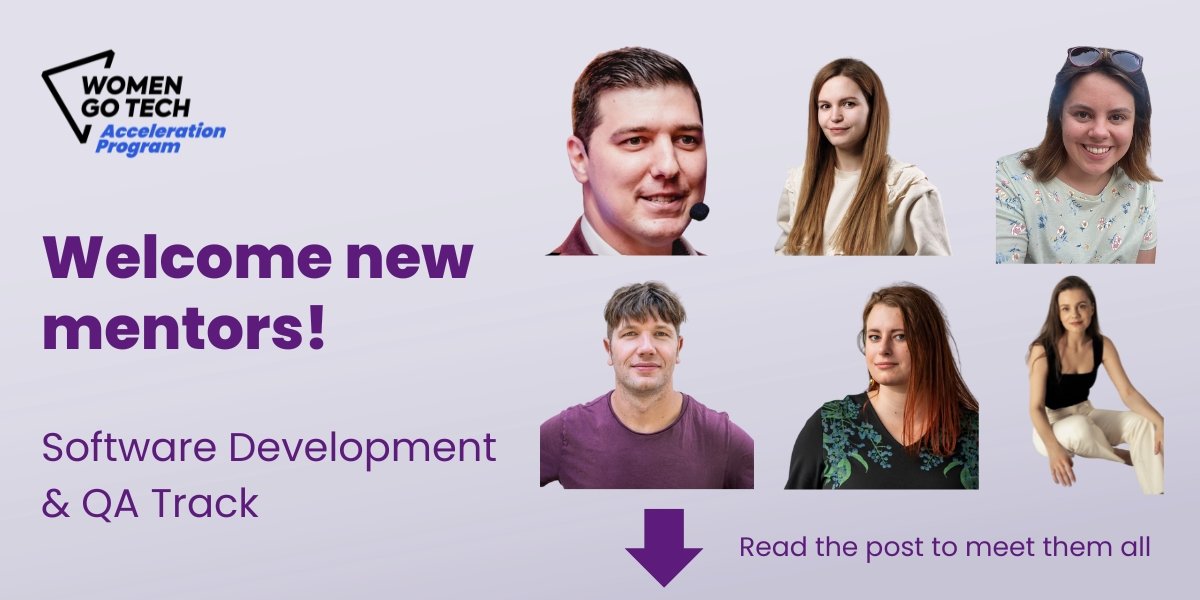
I’m excited to warmly welcome our newest mentors joining the upcoming Software Development & QA cohort of the Acceleration Program. Their commitment to join us marks a significant step toward […]

I’m excited to warmly welcome our newest mentors joining the upcoming Software Development & QA cohort of the Acceleration Program. Their commitment to join us marks a significant step toward empowering aspiring women in tech, enhancing diversity, and catalyzing positive change in the industry.
As we gear up for this new cohort, it’s important to recognize the growing demand for skilled professionals in Front-end and Back-end development, and Quality Assurance.
Our mentors come equipped with extensive knowledge and valuable experience. Over the next six months, they will impart this expertise to their mentees, guiding them through the complexities of tech careers and aiding them in securing their first professional roles.
The program will also provide ample opportunities for learning and growth for both mentors and mentees.
Together, we’ll delve into industry best practices and emerging trends, expand our networks, collaborate on exciting projects, understand what it takes to succeed in the current job market, and foster a supportive community where women can flourish in technology.
Ieva,
Accelertion Program manager
Meet the Mentors of Each Track
Looking to transition into tech? Apply to our Acceleration program.
-
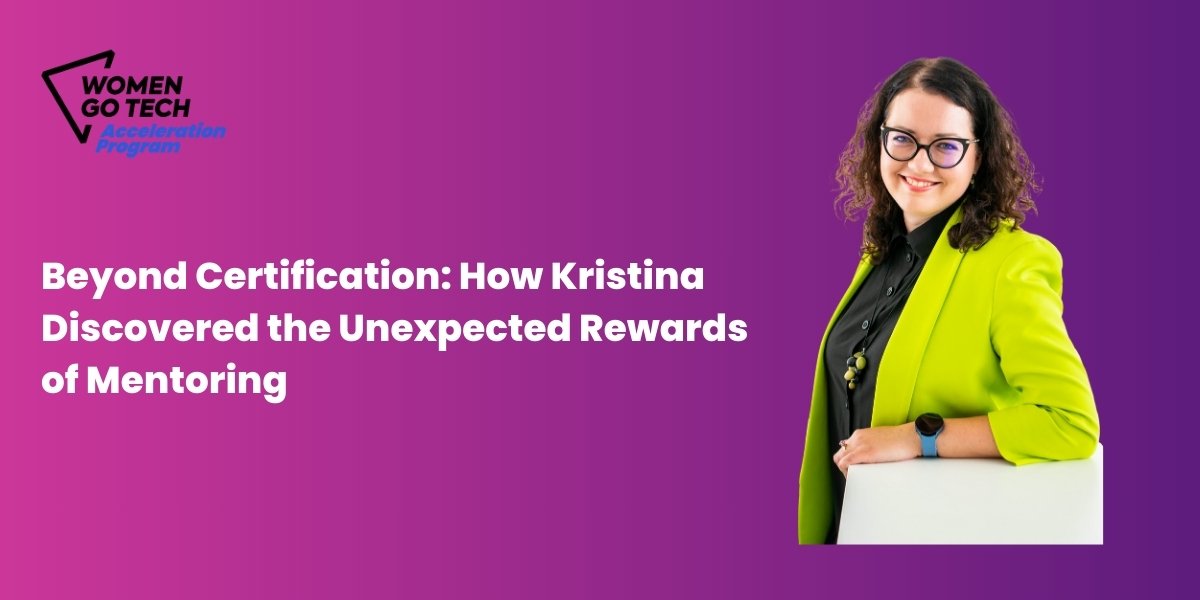
The tech industry thrives on innovation, but that spark often needs a guiding hand. Mentors like Kristina Šuklevičienė, Project Team Manager at Intrum and a 2023 UX/UI Design mentor with […]
The tech industry thrives on innovation, but that spark often needs a guiding hand. Mentors like Kristina Šuklevičienė, Project Team Manager at Intrum and a 2023 UX/UI Design mentor with Women Go Tech, play a crucial role in shaping the future. Kristina’s mentoring story isn’t just about her journey—it’s a testament to the transformative power of mentorship for both mentor and mentee.

Overcoming Self-Doubt to Embrace Mentorship
Kristina was initially hesitant about becoming a mentor. This hesitation stemmed from a lack of formal certifications despite her decade of experience in IT projects.
However, Women Go Tech, and a supportive colleague encouraged her to share her knowledge.
“I felt a responsibility to contribute to the growth of aspiring women in IT,” Kristina reflects, highlighting the value of real-world experience over formal qualifications. This sentiment resonates with many experienced professionals who might undervalue their practical knowledge.
Unexpected Rewards of Mentorship
Through mentorship, Kristina discovered three key takeaways:
- Mutual Learning: “It not only benefited my mentee but also reinforced my own understanding,” she shares, emphasizing the power of knowledge exchange. Mentorship is a two-way street where both parties learn and grow.
- The Power of Curiosity: Kristina underscores the importance of curiosity, which led her and her mentee to explore topics outside their initial scope. “Embracing curiosity became a key element in our mentorship,” she states. A curious mindset fosters deeper learning and discovery.
- Lifelong Learning: The experience solidified Kristina’s belief in continuous learning and adaptation, a crucial skill in today’s fast-paced tech industry.
The Journey, not the Destination
Kristina describes her favorite mentorship moment as the entire Journey, not a specific event. “The joy I felt seeing my mentee confidently declare her goal to become an IT project manager showcased the impact a mentor can have,” she reflects. Mentorship fosters growth and empowers mentees to pursue their ambitions.
Mentorship Essentials: Openness and Curiosity
For aspiring mentors, Kristina offers this advice: “Be open and stay curious together with your mentee.” Mentorship isn’t about having all the answers; it’s about co-exploration and growth.
Kristina shares a success story—a mentee who started applying insights from their sessions to her current job. “Her confidence in using project management methods is promising. She’s already a true project manager,” Kristina observes. Mentorship translates to practical skills and empowers mentees to excel in their careers.
Kristina’s experience exemplifies the profound influence mentorship has on women in tech. It’s a collaborative journey of growth, challenges, and victories, built on the belief that everyone has something valuable to share and new horizons to discover together.
Take on the challenge of helping women transition to tech and grow professionally and personally. Become a mentor.
-
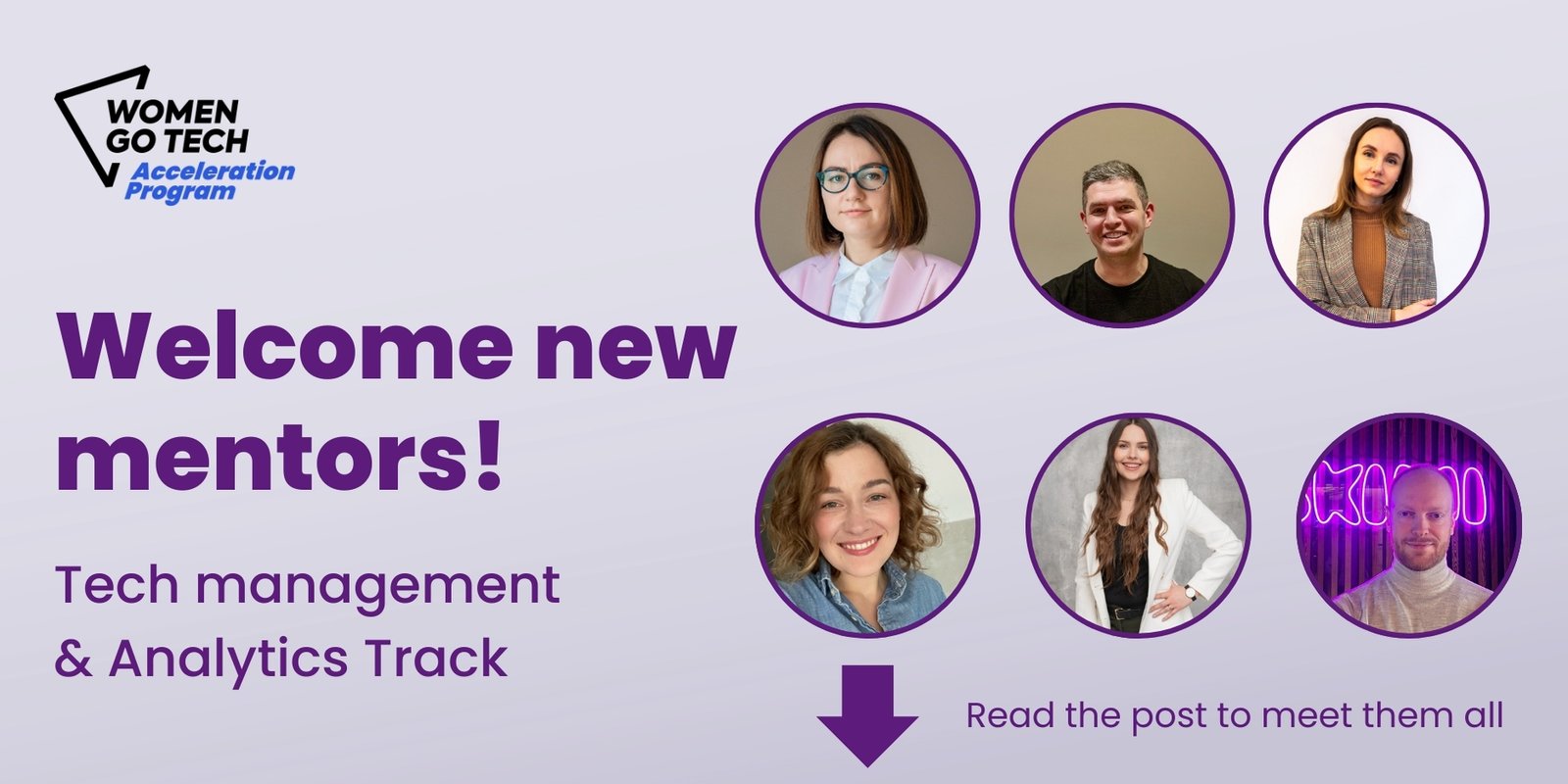
I am thrilled to extend a warm welcome to our new mentors for the upcoming Tech Management & Analytics cohort of the Acceleration Program. Their decision to join us on […]
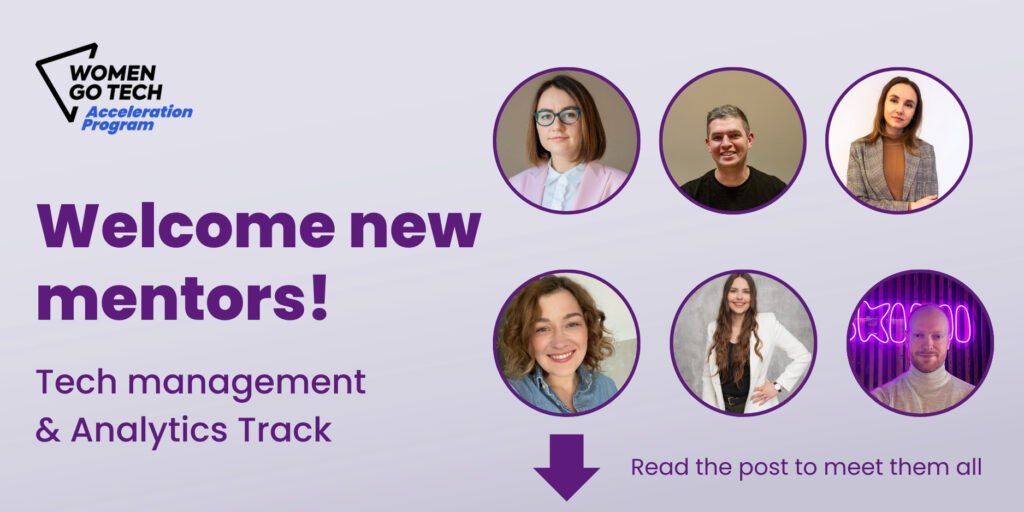
I am thrilled to extend a warm welcome to our new mentors for the upcoming Tech Management & Analytics cohort of the Acceleration Program. Their decision to join us on this journey signifies a deep commitment to empowering aspiring women in tech, fostering diversity, and driving positive change within the tech industry.
As we prepare to kick off this exciting new cohort, it’s crucial to acknowledge the significant need for skilled professionals in IT Project Management, Product Ownership, and Data Analytics fields.
Recent industry reports underscore the growing demand for expertise in these areas, as organizations across sectors increasingly rely on technology-driven solutions to innovate and enhance operational efficiency.
Our new mentors bring a wealth of knowledge and valuable experience to the table. During the 6-month journey in the program, they will share this knowledge with their mentees and play a key role in guiding them through the ins and outs of tech careers, ultimately helping them secure their first positions.
In addition to mentorship, the program will include numerous opportunities for learning and development for both mentors and mentees.
Together, we will explore and discuss industry best practices and new trends, network, collaborate on exciting projects, learn what it takes to succeed in today’s job market and build a supportive community where women can thrive in tech.
Ieva,
Accelertion Program manager
Meet the Mentors of Each Track
Looking to transition into tech? Apply to our Acceleration program.
-

Kostas Mackevičius. Head of QA. Hostinger
-

Margarita Grigalevičiūtė. Data Analyst. Macaw
-

Arvydas Maciulevičius. Head of Technical Service Automation. HELLA Lithuania
-

Rūta Laurikaitytė-Franckevičė. Test Automation Engineer. IBM
-

Dominyka Ragauskaitė. Product Management Lead. Vinted
-

Lina Praškevičiūtė. Leading Product Manager .Vinted
-

Ffion Quick. UX Writer. Wix
-

Andrius Binevičius. Process technology specialist. HELLA
-

Birutė Kiričiuk. Principal Test Engineer. TransUnion
-

Wailana Kalama. Content Designer. Wix
-

Marija Padvilike. Senior System Analyst. EIS Group Lietuva
-

Hanna Matusevich. Quality Assurance Specialist. TeleSoftas
-

Janina Kulikian. Head of Smart Metering. AB „Energijos skirstymo operatorius“ (ESO)
-

Anna Sibirtseva. Senior iOS Developer. Accenture Baltic, Riga
-

Wojciech Popiel. Product Designer. Vinted
-

Mindaugas Balciunas. Lead .Net Developer, Hr-manager. MobilePay
-

Pijus Navickas. Scala Developer. Wix.com
-

Ramunė Šabanienė. Head of Data Science, AI and Analytics. Telia
-

Elena Rumianceva. Front End Developer. IBM
